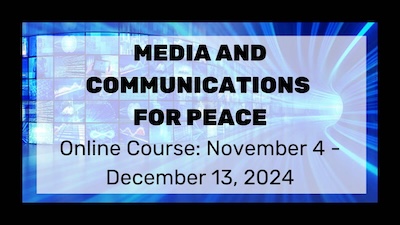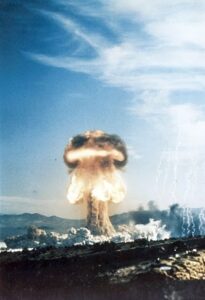Without even considering the tradeoffs or the environmental damage, war directly endangers all life on Earth. War’s weapons risk intentional or accidental apocalypse. We can either eliminate all nuclear weapons or we can watch them proliferate. There’s no middle way. We can either have no nuclear weapons states, or we can have many. This is not a moral or a logical point, but a practical observation backed up by research in books like Apocalypse Never: Forging the Path to a Nuclear Weapon-Free World by Tad Daley. As long as some states have nuclear weapons others will desire them, and the more that have them the more easily they will spread to others still. The Doomsday Clock is as close to midnight as it has ever been. If nuclear weapons continue to exist, there will very likely be a nuclear catastrophe, and the more the weapons have proliferated, the sooner it will come. Hundreds of incidents have nearly destroyed our world through accident, confusion, misunderstanding, and extremely irrational machismo. When you add in the quite real and increasing possibility of non-state terrorists acquiring and using nuclear weapons, the danger grows dramatically — and is only increased by the policies of nuclear states that react to terrorism in ways that seem designed to recruit more terrorists.
Possessing nuclear weapons does absolutely nothing to keep us safe; there is no trade-off involved in eliminating them. They do not deter terrorist attacks by non-state actors in any way. Nor do they add an iota to a dominant military’s ability to deter nations from attacking, given the United States’ ability to destroy anything anywhere at any time with non-nuclear weapons. Nukes also don’t win wars, and the United States, the Soviet Union, the United Kingdom, France, and China have all lost wars against non-nuclear powers while possessing nuclear weapons. Nor, in the event of global nuclear war, can any outrageous quantity of weaponry protect a nation in any way from apocalypse.
While war and humanity exist together, war endangers people in other ways as well. As the world’s top war-maker, base builder, weapons exporter, and military spender — always in the name of “defense” — the example of the United States demonstrates well that war is counterproductive on its own terms. It obviously endangers those against whom it is waged, but also endangers those whose governments wage it, fund it, or arm it from afar. A December 2014 Gallup poll of 65 nations found the United States to be far and away the country considered the largest threat to peace in the world, and a Pew poll in 2017 found majorities in most countries polled viewing the United States as a threat. Any other nation hoping to match the United States in these polls would need to wage a lot more “defensive” wars before it could generate the same levels of fear and resentment. It’s not just the world outside the United States or even outside the U.S. military that is aware of this problem. It has become almost routine for U.S. military commanders, usually just after retiring, to argue that various wars or tactics are creating more new enemies than the enemies they are killing. Terrorism has predictably increased during the war on terrorism (as measured by the Global Terrorism Index). Almost all (99.5%) of terrorist attacks occur in countries engaged in wars and/or engaged in abuses such as imprisonment without trial, torture, or lawless killing. The highest rates of terrorism are in “liberated” and “democratized” Iraq and Afghanistan. The terrorist groups responsible for the most terrorism (that is, non-state, politically motivated violence) around the world have grown out of U.S. wars against terrorism.
Here are some facts summarized by Peace Science Digest: “Deployment of troops to another country increases the chance of attacks from terror organizations from that country. Weapons exports to another country increase the chance of attacks from terror organizations from that country. 95% of all suicide terrorist attacks are conducted to encourage foreign occupiers to leave the terrorist’s home country.” The wars on Iraq and Afghanistan, and the abuses of prisoners during them, became major recruiting tools for anti-U.S. terrorism. In 2006, U.S. intelligence agencies produced a National Intelligence Estimate that reached just that conclusion. The Associated Press reported:
“The war in Iraq has become a cause célèbre for Islamic extremists, breeding deep resentment of the U.S. that probably will get worse before it gets better, federal intelligence analysts conclude in a report at odds with President Bush’s contention of a world growing safer. … [T]he nation’s most veteran analysts conclude that despite serious damage to the leadership of al-Qaida, the threat from Islamic extremists has spread both in numbers and in geographic reach.”
A study of nations that participated in the War on Afghanistan found that in proportion to the number of troops they sent there, they experienced terrorist blowback. So, the war on terrorism reliably and predictably produced terrorism. Veterans of U.S. kill teams in Iraq and Afghanistan interviewed in Jeremy Scahill’s book and film Dirty Wars said that whenever they worked their way through a list of people to kill, they were handed a larger list; the list grew as a result of working their way through it.
War abroad also gives a boost to hatred, bigotry, and violence back home,militarizes local police, proliferates weapons, and normalizes and glorifies militarism. While wars are fought in the name of “supporting” those fighting in the wars, veterans are given little assistance in dealing with the deep moral guilt, trauma, brain injury, and other hurdles in the way of adapting to nonviolent society. Those trained in mass killing by the U.S. military, for example, are disproportionately those who become mass shooters in the United States, where such behavior is of course no longer acceptable. And militaries lose or have stolen huge numbers of guns that are used in violent crimes that are not war.
There are more effective tools than war for protection.
World BEYOND War has developed A Global Security System: An Alternative to War.
David Vine’s 2020 book The United States of War documents how the construction and occupation of foreign military bases generates rather than prevents wars in the areas of the bases.
Recent Articles:










